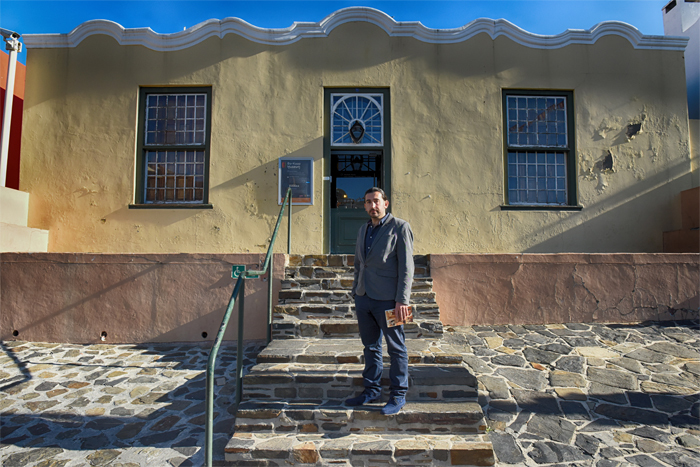Mistaken identity: Scholar sheds new light on museum
05 August 2016 | Story by Newsroom
The Turkish scholar's research reveals that the 'real story' of the Bo-Kaap Museum at 71 Wale Street involves a case of mistaken identity. Gencoĝlu, a PhD scholar in Hebrew Studies, says the original property belonged to Ottoman Muslim scholar Mahmud Effendi and not Abu Bakr Effendi, to whom ownership is ascribed in the museum's own history and other archival material.
The museum is a cultural landmark in Cape Town, established by the apartheid government in 1978 after the authorities bought the house, the oldest property in the Bo-Kaap, and moved its owners. In error, it was identified as being the house of Abu Bakr Effendi.
Gencoĝlu spent months in the Turkish and Cape's archives and his finding is supported by new readings of these archival documents.
Abu Bakr Effendi, a Sufi religious leader, was commonly known as Hanefi'i professor. He arrived at the Cape in 1863 and lived in Bree Street.
“He was sent here to resolve religious conflicts among Muslim groups and impart religious and cultural education,” Gencoĝlu said.
Fourteen years after Aby Bakr died, the Ottoman Caliphate in Istanbul appointed a Shafi'i scholar of Ottoman descent in the Cape, where the majority of Muslims followed the Shafi'i madhhab sect. He was Mahmud Fakih Emin Effendi and he lived at 71 Wale Street until his death in 1914.
While Abu Bakr Effendi and Mahmud Effendi shared a surname and even a neighbourhood (Abu Bakr Effendi owned another property at the corner of Wale and Bree streets, which was an Islamic school until 1899), they were not related.
“The title 'Effendi' was a former Turkish title of respect given to a man of high education or social standing, so both these Ottoman Ulama at the Cape became known as 'Effendi'.”
Mahmud Effendi's son, Muhammed Dervish Effendi, followed in his father's footsteps as a Muslim scholar and lived at the same address in the Bo-Kaap. When he died in 1940 he left his widow, Mariam, and eight children who continued to live at 71 Wale Street until 1978.
Turkish and local archival material
The error in identity has been repeated in various attributions through the years, but Gencoĝlu's research paper, published in New Contree Special Edition: A Journal of Historical and Human Sciences for Southern Africa (no. 73, November 2015), sets the historical record straight. It also highlights the religious and educational contributions to Cape Islamic society during the nineteenth and early twentieth centuries.
The journal's editorial reads: “Gencoĝlu's use of Ottoman archival material to complement the existing Cape records highlights the enormous potential for future studies of the ties between the Cape and the Ottoman Caliphate.”
Gencoĝlu adds: “While Abu Bakr Effendi came from Erzurum in Turkey and was regarded as Turkish-European, Mahmud Effendi was born in Cape Town and regarded as Cape Malay, even if his parents were from Mecca. Abu Bakr Effendi was known as an Ottoman scholar, while Mahmud Effendi was called Ghatib Mahmud among Muslims in the Bo-Kaap.”
Preserving the right history
Setting the record straight to reflect the “forgotten Ottoman scholar” is important.
“It matters to historians,” said the UCT scholar. “At present there is nothing in the museum about Mahmud Effendi or his descendants. How can we preserve the Cape's heritage in this way? We must give credit to a prominent scholar who imparted knowledge to many students in his Islamic school and whose family lived here for over a century.”
These sources have not only contributed to South African historiography, but have also rectified the story of an eminent historical figure who enriched the socio-cultural lifestyle of Muslims with his noteworthy educational activities at the Cape.
One way to protect the actual heritage of the Bo-Kaap Museum would be to consider restructuring the 71 Wale Street property in light of the new findings based on Turkish and Cape archival sources, says Gencoĝlu.
Intriguing UCT link
There is another intriguing subplot to the story that has a link to UCT. Mahmud Effendi was the great grandfather of Professor Del Kahn, head of the Division of General Surgery at UCT and Groote Schuur Hospital.
After the apartheid government identified the house for the museum, the family was given a month to vacate the property.
Kahn picks up the story: “Dervish Effendi was my grandfather, but he died before I was born – in fact none of my cousins know him. I have one cousin named after him. We all knew our grandmother, Mariam Effendi, very well and she died much later.
Though he never lived there, the house at 71 Wale Street has very fond memories for the family, says Kahn.
“It was the most popular destination for the extended family, which included my grand-aunt who had a very large family, especially over New Year's Eve and New Year's Day because of the strategic position for the Coon Carnival.”
After the house was claimed for the museum, Kahn says that his grandmother, aunt and uncle moved to Heideveld in the late 1970s.
“But the layout of the museum is completely different to how it was when my grandmother lived there.”
Read more about the Bo-Kaap Museum story...
Story Helen Swingler. Photo Michael Hammond.
Read more about Halim Gencoĝlu's research into the first black medical doctor at UCT.
 This work is licensed under a Creative Commons Attribution-NoDerivatives 4.0 International License.
This work is licensed under a Creative Commons Attribution-NoDerivatives 4.0 International License.
Please view the republishing articles page for more information.










